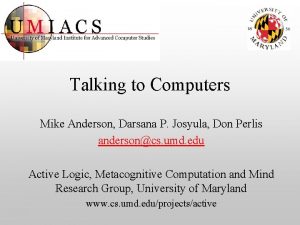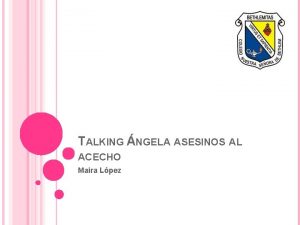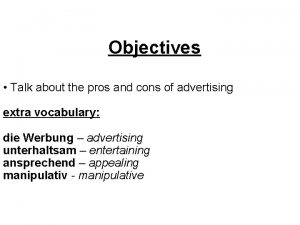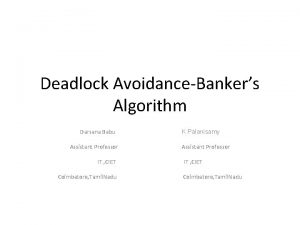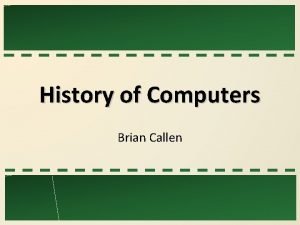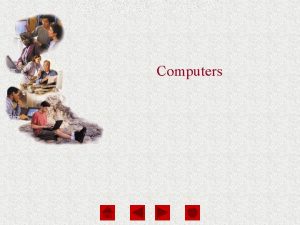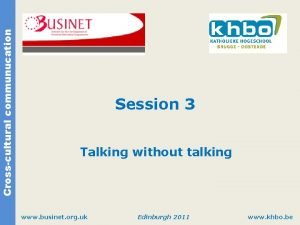Talking to Computers Mike Anderson Darsana P Josyula












- Slides: 12

Talking to Computers Mike Anderson, Darsana P. Josyula, Don Perlis anderson@cs. umd. edu Active Logic, Metacognitive Computation and Mind Research Group, University of Maryland www. cs. umd. edu/projects/active

• • • Outline of Presentation Mistakes and Meta-Reasoning Conversational Adequacy HCI--Our Approach Example-reference resolution Accomplishments Future Research

I. Mistakes and Meta-Reasoning • • • Conversation is error-prone. Monitoring and discussing the ongoing conversation (grounding) is an important resource for dialog repair. The ability to ask about words and concepts is central to learning

II. Conversational adequacy • • • Is the ability to engage in free and flexible conversation. Meta-dialog is necessary to conversational adequacy Meta-dialog can make up for deficiencies in other areas of linguistic ability (Perlis, et al. , 1998)

III. HCI-Our Approach Objective An error tolerant, flexible and user-sensitive natural-language interface. Approach Metareasoning using active logic to detect dialog anomalies, and manage appropriate responses, including learning new words. ALMA (Active Logic MAchine) (i) reasons with contradictory data; (ii) retracts old conclusions; and (iii) reasons about its own history including changes in its beliefs.

IV. Example Reference resolution without meta-reasoning • • User: Send the Chicago train to Philadelphia. [System sends a train that has just arrived in Chicago, to Philadelphia. ] • User: No; send the Chicago train to Philadelphia. • [System resets itself and then sends the same train as before. ] ** Inappropriate repetition of mistake **

IV. Example (2) Reference resolution with autonomous meta-reasoning • • User: Send the Chicago train to Philadelphia. [System sends a train that has just arrived in Chicago, to Philadelphia. ] • User: No; send the Chicago train to Philadelphia. • [System resets itself and then sends the train that has been at Chicago overnight. ] ** System recognizes its mistake, and alters its behavior appropriately **

IV. Example (3) Reference resolution with interactive meta-reasoning • • User: Send the Chicago train to Philly. System: What is Philly? User: Philly is Philadelphia. System: OK. [System sends a train that has just arrived in Chicago, to Philadelphia. ] User: No; send the Chicago train to Philly. [System resets itself and then sends the train that has been at Chicago overnight. ]

IV. Accomplishments ALFRED can: • Maintain context and history • Resolve ambiguous references • Introspect • Learn new words • Identify miscommunications • Understand the use-mention distinction • Generate utterances • Use meta-dialog • Connect to different domains.

User Task-Oriented Interactive System Link Parser Domain Controller Command Detection Expectations Handling Learning Intention Discernment Reference Resolution Context based Parsing Ontology Tracking Error Handling Needs Handling Introspection Contradiction Handling Utterance Generation Alfred Modules Domain Commands Domain objects, relationships and associations Context Alfred (Internal) Commands Names, relationships and associations Alfred knowledge base (KB) ALFRED: Active Logic for Reason-Enhanced Dialog

V. Future Research Metacognitive Loop 1. Note an anomaly has occurred 2. Assess the anomaly a. characterize its type b. assemble options for addressing it 3. Guide one or more of the options into place a. choose option(s) to use b. monitor (and control, when needed) the performance of the option(s). Specific Dialog Projects • Learn new concepts • Generate and track dialog expectations and structure • Corpus study on the frequency and types of meta-dialog in conversation

Talking to Computers Mike Anderson, Darsana P. Josyula, Don Perlis anderson@cs. umd. edu Active Logic, Metacognitive Computation and Mind Research Group, University of Maryland www. cs. umd. edu/projects/active
 Darsana josyula
Darsana josyula Mimamsa darsana
Mimamsa darsana Anjani josyula
Anjani josyula Let's stop talking to each other
Let's stop talking to each other Talking it over julian barnes
Talking it over julian barnes The robots are talking about millie
The robots are talking about millie Talking angela ojos
Talking angela ojos Jesus talking to his disciples
Jesus talking to his disciples Talking about pros and cons vocabulary
Talking about pros and cons vocabulary Julian barnes talking it over
Julian barnes talking it over I am talking on the phone
I am talking on the phone Decide whether the relative pronoun is correct or not.
Decide whether the relative pronoun is correct or not. Are we talking today
Are we talking today
